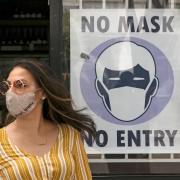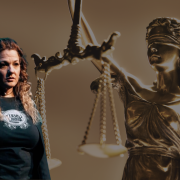What ever happened to the maxim, Live and Let Live? If our experience during the lock downs was any indicator, evil’s mask is now fully ripped off (pardon the pun) and any pretense of allowing a person to pursue his bliss unhindered is long gone.
Over the last several years we have seen stores attacking their own customers for refusing to wear a useless surgical mask. We saw restaurants and other private establishments checking the medical status of their patrons before being allowed inside. We saw police checking the papers of citizens on the street. I wonder, instead of having to carry an inoculation card around to prove our ‘vaccination’ status, wouldn’t it just be simpler if we just sewed a symbol on our coats? Maybe a yellow star or something? The old ways are the best ways, amirite?
Worse still, many of these businesses were enthusiastic enforcers of the illegal government mandates. As an example of just how infiltrated our culture has become, did you know that in the early 20th century, many American businesses were against the automatic withholding of income taxes for the simple reason that it forced businesses to become uncompensated agents of the newly established Internal Revenue Service (and continue as such today)?
But not this time around. This time, not only was there only a modicum of pushback by businesses to join the Mask Enforcement Bureau, but some actually embraced their inner tyrant in the exercise of this new-found, corrupt and illegal power over their fellow citizen. I should create a patch that reads, “I Was a Conservative In Portland During the Lockdowns”
With this in mind, I wanted to share with you something I found online that I felt was a good example of the underlying thinking of the people who happily tried to put the “un-vaccinated” into concentration camps. The truly horrific thing here is that this person honestly believes what they’re saying. Have a look:
“The shopping cart is the ultimate litmus test for whether a person is capable of self-governing.
“To return the shopping cart is an easy, convenient task and one which we all recognize as the correct, appropriate thing to do. To return the shopping cart is objectively right. There are no situations other than dire emergencies in which a person is not able to return their cart.
“Simultaneously, it is not illegal to abandon your shopping cart. Therefore, the shopping cart presents itself as the apex example of whether a person will do what is right without being forced to do it. No one will punish you for not returning the shopping cart, no one will fine you or kill you for not returning the shopping cart, you gain nothing by returning the shopping cart. You must return the shopping cart out of the goodness of your own heart. You must return the shopping cart because it is the right thing to do. Because it is correct.
“A person who is unable to do this is no better than an animal, an absolute savage who can only be made to do what is right by threatening them with a law and the force that stands behind it.
“The Shopping Cart is what determines whether a person is a good or bad member of society.”
I hope the tyranny that is only lightly sleeping in this person’s mind is as visible to you as it is to me. All this author needs is a government mandate that requires putting your cart back and empowers individual citizens to report any ignorant shopper foolish enough to not comply.
But I want you to see something: the writer’s underlying premise. She asserts that a person’s right to self-govern is contingent on their ability to self-govern. This, my friends, is the very top of the slippery slope and completely misapprehends what a ‘right’ is at all. There is no recovery from this starting point and it all goes downhill from this underlying assumption.
A belief based on the premise of contingent rights is an abomination to Humanity and Human Respect itself.
Now I’m not here to argue whether returning a shopping cart is good, bad, or completely devoid of any value at all. After all, opinions may differ on the subject (the very definition of ‘subjective’). But I would like to highlight that this short passage of someone pretending to intellect and insight is the very epitome and embodiment of the rotten reasoning displayed by the Karens that we encountered during the illegal lockdowns and mask ‘mandates.’
The Road Paved with Good Intentions Inevitably Leads To…
Let’s engage in a thought experiment to show our citizen-tyrant where their reasoning ultimately leads.
Remaining within the context of the grocery store, this anonymous author, believes that anyone NOT using the corrals are inherently ‘bad’ and summarily incapable and unworthy of self-governance. OK. Now consider the implication she creates: This inability to self-govern means that some authority must step in to correct and manage the noncompliant citizen.
But this same grocery store also provides kiosks for self check-out, doesn’t it? And yet no similar requirement to make use of this other employee-reduction tool exists within the author’s mind. Why not? I’ll simply say because she hasn’t thought of it yet! But she will…
The grocery store provided these machines for use by customers just as with the shopping cart corrals. All that is missing is a slick marketing campaign by a grocer attempting to stay in business in an environment of constantly rising costs (I hear Pfizer’s marketing department might be available) to convince the shopping public that using self check-out is the ‘right and good’ thing to do; anyone failing to use the self check-out kiosks generously provided by the grocer is inherently ‘bad’ and suitable for shunning or arrest (God help you if you went to the human cashier maskless…)
Think I’m kidding? Think I’m exaggerating? Don’t forget, these are the same people who spent 50 years preaching ‘my body, my choice’ to justify killing children but when the marketing changed, suddenly the individual had no right to refuse what was injected into their body. The intellectual dishonesty and logical contortions this requires puts Wetzel’s Pretzels to shame.
So now that people have been instructed that using self check-out is the ‘right and good’ thing to do, the grocer may now reduce the grocery’s workforce. See how that works? That simple and repeated marketing meant to change behavior and imbued with ‘goodness’ ultimately leads to the firings of grocery store employees around the world. And why? Because the road to hell is paved with good intentions (and marketing).
I’m reminded of a woman I dated in the 1990’s. She was nice enough; smart, pretty, and clever. Unfortunately, her parents were very liberal and she graduated from Middlebury College, a small private, liberal Arts college in Vermont. She didn’t stand a chance of maintaining any individuality of thought after being steeped for so long in such an illiberal environment.
Politically, there was little we had in common, but if we avoided political conversations, things went generally smoothly. Now, as you might imagine, she was fully invested in the recycling religion. She separated garbage with all the solemnity of Catholics taking Communion and she never missed a chance to try and ‘re-educate’ me on the topic (it was a short relationship).
That is, until one day when I told her that I care about the homeless too much to recycle. The quizzical look on her face told me that I had introduced a concept she was struggling to understand, and I was loving it. So I explained it to her:
“The existence of garbage and the desire to recycle has created a micro-economy in every city in the United States. This micro-economy has producers, consumers, retailers and cash flow just like any other marketplace. I am not talking about the garbage men who pick up your nicely separated trash. I am talking about the homeless.
“The homeless absolutely depend on their ability to pick through garbage, pull out the aluminum cans and sell them to recycling centers. This meager amount, such as it is, allows them to earn an income and provides them the ability to survive within an urban center. This micro-economy provides a service to the city (recycling) while at the same time provides cash flow to those who need it most and are willing to engage in the work.
“If you separate your garbage yourself and allow the garbage company to collect it before the homeless can collect it themselves, you have effectively made the homeless even more desperate than they already are by removing a key source of income.
“The free market has already provided a solution and rendered moot the need to separate our trash. Don’t you care about the homeless?”
Forcing my girlfriend to choose between two sects within her Liberal religion was just icing on my rhetorical cake. And I’m not positive, but I’m pretty sure that my 1990s Middleberry-educated girlfriend would get along like a house on fire with the shopping cart author.
I can just hear it now.
“Separating your trash for recycling is the ultimate litmus test for whether a person is capable of self-governing. Recycling is an easy, convenient task and one which we all recognize as the correct, appropriate thing to do. Recycling is objectively right. There are no situations other than dire emergencies in which a person is not able to recycle.”
The Solution
As we’ve seen over and over again, it appears that it is inherent within Human Nature itself to desire power over others. Whether it is forcing others to wear masks, return shopping carts or shame people from smoking in public, we will never escape Karens, in all their forms, and their inherent desire to control their fellow citizens. We also will never escape the dogmatic and evil marketing meant to force us into these frameworks of acceptable thought (yet more control).
The solution to this is not yet more control or a banning of this or that. It is but mere education on the nature of Natural Rights, the very foundation of the American Constitution that we may knowledgeably resist control by others and create a truly free world.
Here’s to watching the other shoe drop in 2024!
Good Luck,
R. Altomare
Founder, BreathEasy
breathez.org
Find Patriot Businesses, Spread the Word, Live Your Life






 With everything going on in the world, both seen and unseen, there is no shortage of topics.
With everything going on in the world, both seen and unseen, there is no shortage of topics.







 And let’s not forget E. Jean Carroll, the Hail Mary attempt at accusing Trump of a lingerie section assault straight out of a Law & Order episode (LITERALLY!). It’s like they picked the most delusional play on the playbook and threw it into the end zone, hoping for a miracle. The sexual assault plot straight from a TV show? Really? It’s almost cute how low they’ve sunk.
And let’s not forget E. Jean Carroll, the Hail Mary attempt at accusing Trump of a lingerie section assault straight out of a Law & Order episode (LITERALLY!). It’s like they picked the most delusional play on the playbook and threw it into the end zone, hoping for a miracle. The sexual assault plot straight from a TV show? Really? It’s almost cute how low they’ve sunk.


